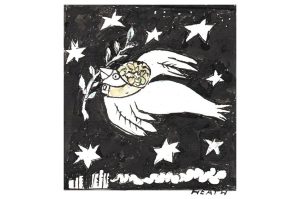Over the course of tonight and tomorrow, Jews around the world will eat a lot of hamentaschen, dress up in costumes, listen to the megillah, and give charity and gifts of food and drink to their friends. Some of us will also get quite drunk; partly because it’s fun, and partly because the Talmud says that on Purim, a person should be so drunk that they cannot distinguish between Haman (villain of the Purim story) and Mordecai (one of the heroes of the Purim story). As far as Jewish holidays go, Purim is a fun one which means that many of its crucial lessons often go unappreciated. Americans tend to know that on Passover, we celebrate the Exodus from Egypt, and that on Rosh Hashanah and Yom Kippur, we atone and hope to be inscribed in the book of life. But what do they really know about Purim?
The past months and years have seen a resurgence of anti-Semitism in various, but equally pernicious, forms. So it feels like a good time to put a spotlight on a holiday that celebrates the triumph of a persecuted nation over a man, and a people, that sought to destroy it. Let’s start with the basics. The key characters of the Purim story are Achashverosh, a Persian king, Haman, one of his advisers, Esther, a Jew who becomes queen, and Mordecai, her relative.
Haman was the senior most adviser to the king, and as such, it was customary for all who passed him to bow down. Mordecai refused to do so. There are a lot of reasons given by various Jewish commentators for why Mordecai chose not to bow to Haman, but the simplest is that the kind of bowing Haman was demanding was too close to idolatry — that Mordecai, as a Jew, did not want to give off the impression that he saw divinity in a human being. This crucial part of the story — from which everything else stems — always reminds me of my own family’s experience with a genocidal nation that sought to destroy us. In the late Thirties in Berlin, my great-grandfather was walking home one day when a group of Hitler youth stopped everyone in the street and demanded a sieg heil. Max Last felt the same way Mordecai did. That he could not, in good conscience, treat another human as a divine being to be worshipped. He refused, and was beaten within an inch of his life. Hitler went on to massacre millions of Jews, and had he had his way, Haman would have done the same.
Incensed by Mordecai’s refusal, Haman decided to kill not just Mordecai, but all of the Jews of Persia. He chose the date of their would-be destruction by lottery, or Pur, giving us the name Purim. Haman’s pitch to the king was simple: the Jews are different, they follow different laws, and the country gains nothing by tolerating their existence. Sounds familiar. Achashverosh essentially gives Haman the green light to do as he pleases, and he decrees that on the 13th day of the 12th month, all citizens are to ‘destroy, massacre, and exterminate all Jews, young and old, children and women.’ Also familiar.
Mordecai writes to Esther, pleading with her to intercede with the king on behalf of her people. She hems and haws, frightened, because of a law that forbids people — even the queen — from visiting the king without having been summoned, the punishment for which was death. Mordecai sends back a chilling message that feels hugely relevant to today: ‘do not imagine that you, of all the Jews, will escape with your life by being in the king’s palace.’
For Esther, the king’s palace was a literal place with all the perks and luxuries one might naturally expect. But Jews — and other minorities — have always had segments of their populations that had been lulled into believing that they too resided in some metaphorical kind of king’s palace. That they would be shown preferential treatment, that they would be saved, while their counterparts perished. It’s never been true — not during the Inquisition, not during the Holocaust or the pogroms, and now now. For those who want to annihilate us, it doesn’t matter whether we only have one Jewish grandparent or have voted with progressives in the last 10 elections. It doesn’t matter whether we have served this nation or whether we have friends in high places. It doesn’t matter whether we rail against Zionism and call for BDS.
This holiday is not about putting on costumes, but about realizing that masks are ephemeral disguises that only cloud the truth. We wear them, and so do those who wish to destroy us. The Megillah’s message is clear: you can’t live if you don’t know who you — and your enemies — are.
Daniella Greenbaum Davis is a Spectator columnist and a Senior Contributor to the Federalist.


















